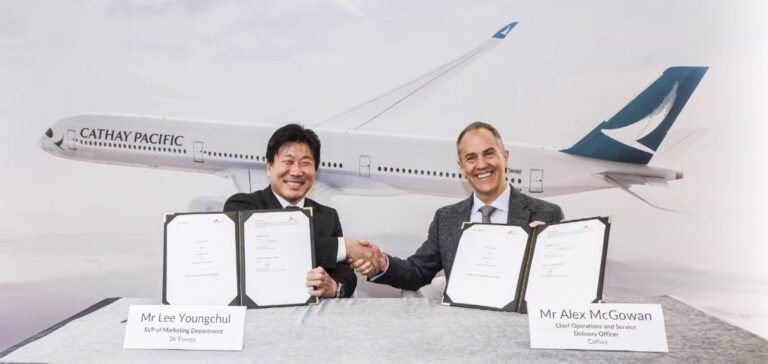South Korean company SK Energy has signed an agreement with Hong Kong airline Cathay Pacific to supply 20,000 metric tons of Sustainable Aviation Fuel (SAF), certified by the International Sustainability and Carbon Certification (ISCC). Deliveries under this contract started at Incheon International Airport in late 2024 and will continue through 2027. This agreement comes shortly after SK Energy successfully exported its first shipment of SAF to Europe, in a clear indication of the growing involvement of South Korean refiners in SAF production and international exports. This move highlights SK Energy’s intention to expand progressively into the SAF sector.
A regulatory context favorable to SAF
The signing of this contract occurs within an accelerating global regulatory framework aimed at promoting greater SAF use. The International Air Transport Association (IATA) has set a target to cut aviation carbon emissions by 50% by 2050 compared to 2005 levels. Several Asian countries are gradually adopting regulations designed to increase the use of SAF. South Korea, for example, will mandate a minimum blending ratio of 1% SAF for all international flights departing from its airports starting in 2027, supported by tax incentives for domestic refiners.
Saf production technology
To produce this alternative fuel, SK Energy uses co-processing technology, integrating bio-based materials directly into existing refining processes. This method enables rapid large-scale production of sustainable aviation fuel and bio-naphtha compliant with ISCC certification requirements. Co-processing is increasingly preferred due to its compatibility with existing refinery infrastructure, significantly lowering initial investment costs and facilitating rapid market entry. This technological approach aligns with the strategic needs of refiners seeking quick deployment at lower initial investment.
Competitive environment in asia-pacific
This agreement occurs amid increased competition among major refiners in the Asia-Pacific region. In Singapore, Neste is continuing to expand its SAF production capacities, with plans to supply additional regional airports. Japan’s ENEOS is also positioning itself actively, with significant expansions planned for its SAF production volumes. Hong Kong represents a strategic entry point for SK Energy into the Asia-Pacific market, a region increasingly targeted by refiners due to new regulatory pressures and growing demand from international airlines.
Airlines responding to regulatory pressure
Airlines like Cathay Pacific are preparing to incorporate larger volumes of SAF into their operations in response to regulatory requirements emerging across Asian markets. Starting in 2026, Singapore will impose a mandatory minimum blending of 1% SAF in aviation fuels sold within its territory. Other nations, including South Korea and Japan, are also preparing similar regulatory measures, thus increasing the pressure on airlines to secure stable SAF supplies in the medium to long term. Under these conditions, direct partnerships between airlines and refiners could become increasingly strategic for securing SAF supplies.






















